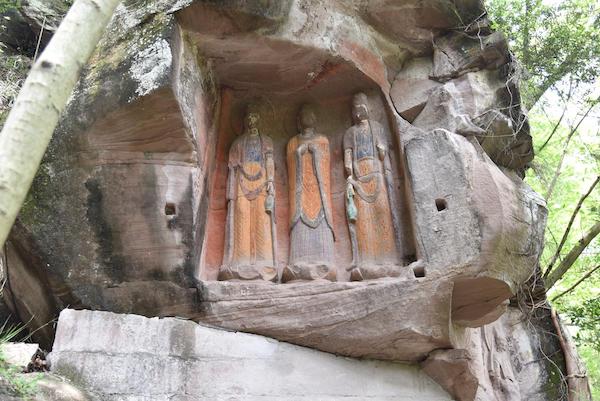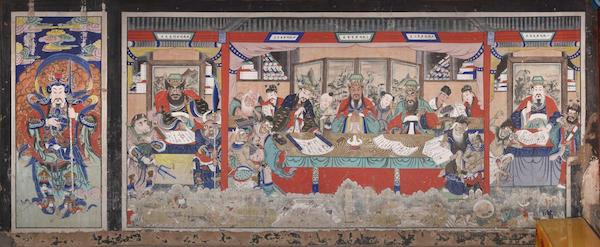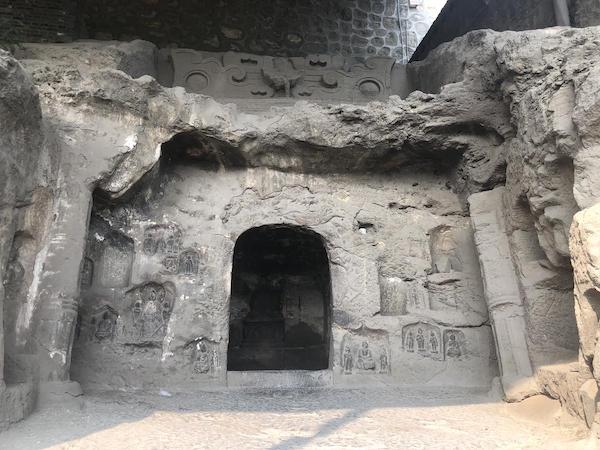-

Photo by Bruce Rusk
From the Ground Up: Buddhism and East Asian Religions Project (FROGBEAR) is one of cIRcle’s long-standing partners and a valuable contributor to our open access repository. FROGBEAR is an international and interdisciplinary project coordinated by the UBC Department of Asian Studies. Made possible in part by a $2.5 million grant from the Canadian Social Sciences and Humanities Research Council (SSHRC), FROGBEAR aims to foster the next generation of scholars working on Buddhism and East Asian religions through innovative practices of research and training, including creating new digital materials made publicly accessible through cIRcle.
About FROGBEAR
FROGBEAR has worked in partnership with cIRcle to share its research outputs since 2016 and is one of cIRcle’s first large-scale grant-funded research project support collaborations. Today, these project materials represent one of cIRcle’s largest non-thesis collections, with more than 1,100 item records featuring textual, photographic, audiovisual, and other materials related to key sites of religious practice and knowledge in East Asia. Content is organized by Research Cluster which, in turn, is structured around a different theme or fieldwork trip. Through our ongoing partnership with the FROGBEAR team, in particular Bruce Rusk and Vicky Baker, cIRcle has been able to develop new practices and procedures for supporting UBC’s robust research community.
FROGBEAR materials in cIRcle can be accessed through UBC Library’s Open Collections and through the project’s FROGBEAR Database, populated via the Open Collections Research API. The FROGBEAR Database is one of the earliest and best-known use cases for the Open Collections API and connects all of the relevant items archived in cIRcle directly to the project’s research website. Using the API and the latitude/longitude metadata elements in cIRcle, all of FROGBEAR’s records can be viewed ‘in situ’ through an interactive map tool.
-

Photo by Christoph Anderl
New content, new workflows
With field visits on hold due to COVID-19, FROGBEAR explored alternative opportunities to expand the collection. In 2021-22, cIRcle added more than 700 new high-quality images created by Hannibal Taubes, University of California at Berkeley East Asian Languages and Culture graduate student. Featuring many unique composite and panorama images, these digital photographs provide helpful context for understanding how the objects are experienced on site. Most recently, the cIRcle team created 155 new item records from Cluster 3.4: Typologies of Text and Image Relations (Cliffs/Caves), led by University of Ghent professor Christoph Anderl. Nearly 700 individual photographs and multimedia files were included in this cluster alone, representing the largest batch of content processed by cIRcle for a single submission request. Metadata for these items was produced by graduate students working collaboratively online, providing students with training on metadata input standards and a chance to think and learn about scholarly metadata production.
One of the most significant opportunities of working with FROGBEAR was the development of workflows for processing large batches of content. In collaboration with the FROGBEAR project team and Danielle Bugeaud, then Cataloguing and Metadata Librarian liaison for cIRcle, the cIRcle team designed a metadata template spreadsheet with the purpose of enabling field researchers to capture and record structured metadata for their content in a format that supported processing large batch content uploads to the cIRcle repository. This template has since become our go-to tool for collaborating with content providers seeking to deposit more than 10 items at a time.
-

Composite image by Hannibal Taubes
Meaningful metadata
FROGBEAR is also the largest collection in cIRcle featuring non-English metadata. Many of the objects and sites recorded had long complex histories resulting in lost, altered, or variant names in different languages, and forms of language, over long periods of time and across multiple geographic locations. Primarily designed to describe traditional scholarly outputs in Western languages such as theses and published articles, cIRcle metadata standards could not fully reflect the nuances of these objects nor did cIRcle staff have the subject matter and language expertise to ensure appropriate quality control for the descriptions. Working in collaboration with Danielle Bugeaud and the FROGBEAR team, the cIRcle project lead, Tara Stephens-Kyte, and then Work Learn student Mariah Gastaldo, developed extensive support materials to guide metadata creation by FROGBEAR’s researchers, including instructions on how to create devised titles which are commonly used in instances where there is no formal name on the resource itself or where other issues make applying a formal title challenging. These instructions have also informed other partnership projects, such as the Making Research Accessible initiative when Downtown-Eastside community-generated materials were digitized and added to cIRcle.
In addition to the complexities of attempting to standardize metadata and content creation, the FROGBEAR project also necessitated extensive requirements analysis and planning for permissions as individuals responsible for creating metadata were sometimes not those responsible for creating the content nor might they have the authority to permit photography and recording on specific sites or of other individuals. As such, translated versions of licenses such as the Consent to Disclosure of Personal Information were required to accommodate the needs of their field researchers throughout Asia. With FROGBEAR and similar projects in mind, cIRcle updated the cIRcle Non-Exclusive Distribution License in 2021 to include terms for consent to use of image and audiovisual recordings.
-

Photo by Yi Zhang
New partnerships through FROGBEAR
Since first partnering with FROGBEAR six years ago, cIRcle has consulted with numerous other grant-funded research projects using many of the best practices for metadata, content creation, and permissions developed for this collection such as ‘Expertise, Labour, and Mobility in Nepal’s Post-Conflict, Post-Disaster Reconstruction (Reconstructing Nepal Project)’. The cIRcle team has also increased its capacity to support collections with large ongoing or retrospective deposits such as the Database of Religious History and UBC Social Ecological Economic Development Studies Student Reports (SEEDS) using workflows and technical enhancements developed for FROGBEAR. Many of the recommendations that evolved from the FROGBEAR partnership have also informed cIRcle instruction and outreach activities such as the as the 2021 Open Scholarship in Practice session Preparing and Preserving Your Research Outputs : Basics and Beyond.
If you have a research project that might benefit from cIRcle services and you’d like to book a consult, please contact us and let us help you share your research with the world!
Click here for the original post.








